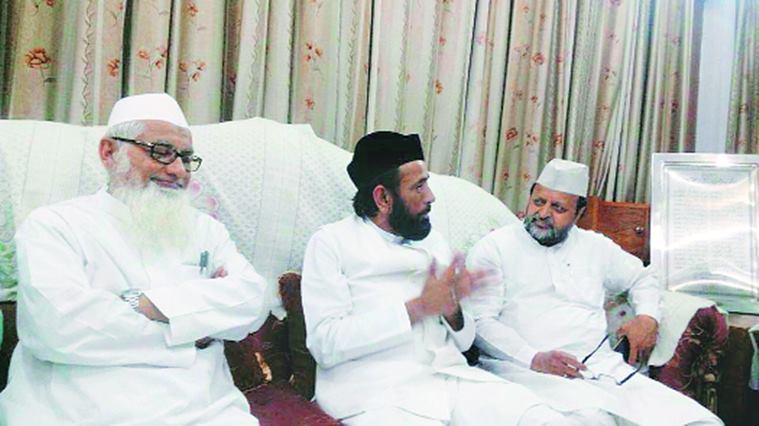The 25-Second Trick For Barelvi
Wiki Article
Barelvi - An Overview
Table of ContentsThe Definitive Guide for BarelviThe Ultimate Guide To BarelviSome Of BarelviEverything about Barelvi
Radical Islamist groups in South Asia such as the Taliban are commonly categorized as Wahhabis, coming from the austere, puritanical kind of Islam institutionalised in Saudi Arabia. While the ties between the Wahhabis as well as the Taliban are tight, the latter in fact belong to a different branch of the faith.Sunni Islam is divided right into four orthodox colleges of legislation (Madhhabs), each of which is complied with in unique parts of the Muslim globe. A variety of rites and petition types additionally differ amongst the colleges. As the map above indicates, Wahhabism, based in Saudi Arabia, is associated with Hanbali regulation, the strictest kind of Islamic law.
" Sunni Muslims," Haqqani composes, have cast apart their aversion to Wahhabi teams, developing a multitude of traditional Sunnis who accept Wahhabi political as well as jihadi suggestions without necessarily providing up their rites and rituals." As is usually kept in mind, Saudi Arabian religious financing has actually assisted break down the obstacles between both sects.
7 Simple Techniques For Barelvi
Mapping the four standard institutions of Sunni Islamic legislation is reasonably easy, although the writers of the Wikipdia map published above deserve commendation for doing a specifically excellent task. However the differences that really matter are not those of Madhhab, however instead are found amongst less formal and a lot more current "activities" within Islamic idea and method.The Deobandi motion is aligned with Wahhabism and also advances a similarly harsh, puritanical analysis of Islam. The Barelvi activity, on the other hand, protects a much more conventional South Oriental version of the confidence fixated the practices of Sufi mysticism. In India and also particularly Pakistan, stress in between the two groups can be intense, occasionally verging on open war.
As just recently reported in the, "When the Taliban took control of Buner in April 2009, they first besieged Pir Baba's temple. Taliban leader visit site Fateh Khan stated it was since the location was a hub of 'infidelity and idolatry.'" Consequently, many Sufi shrines are now greatly secured by Pakistani safety and security pressures.
One can, nonetheless, conveniently portray their place of origin, as both activities are named for towns in north India: Deoband as well as Bareilli. Although radical Deobandi teams are most very closely related to Pakistan as well as Afghanistan, the activity's intellectual as well as spiritual heart is still the Indian city of Deoband. Its Darul Uloom Deoband is reputed to be the second biggest madrasah (spiritual institution) in the Sunni Muslim globe, complying with only Al-Ahzar in Cairo.
An Unbiased View of Barelvi
Strong numbers are impossible to locate, many experts preserve that Barelvis dramatically out-number Deobandis not simply among Indian Muslims but in Pakistan., "some 15 per cent of Pakistan's Sunni Muslims would consider themselves Deobandi, and some 60 per cent are in the Barelvi custom.Early Deobandi leaders were troubled by the triumph of British colonialism and English-language education, which they sought to battle by purifying their religion, removing mystical methods and also other advancements that they considered as as opposed to the faith (Barelvi). basics One of the most hardline Deobandis came to pertain to Barelvis, as well as Shiites, as non-Muslim opponents deserving of attack.
Deobandi thinking is too traditional to be nationalistic, concerning the neighborhood of the faithful, not the contemporary nation-state, as the appropriate Quranic political lorry. A lot of Deobandi scholars turned down the dividers of British India in 1947, preferring to look for the spread of Islam in an undivided India. The concept of Pakistan, in addition, was initially accepted by Muslim groups abhored by the hardline Deobandis (Barelvi).
As an outcome, the Pakistani federal government increasingly veered in the instructions of the extreme Deobandi movement. The link, however, is a two-edged sword for modern-day Pakistan, as the Deobandi faithful ultimately have contempt for nationwide identifications as well as boundaries.
All About Barelvi
Critics link it to terrorist pop over to this web-site organizations; the Taliban, after all, sprang out of Deobandi madrasahs in northeastern Pakistan, as did numerous various other violence-prone organizations. Shocking fatwas (religious judgments) do not help its reputation (Barelvi). In May 2010, a mandate that women can not work for incomes stunned mainstream Muslim point of view worldwide.

As Abedin writes: On the question of supposed Wahabism I place it to Madrassi that many movie critics of the Deoband seminary insurance claim that Deobandi beliefs are just a tiny action away from full-scale Wahabism. In feedback the deputy Vice Chancellor makes a clear separation between both schools of idea, before including that if we think about the Wahabis and the Barelvis as 2 extremes, the Deobandis inhabit the centre ground because continuum.
Report this wiki page